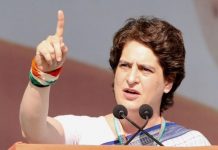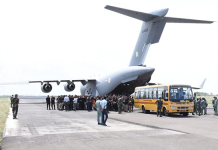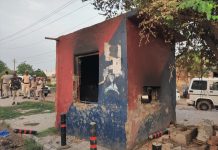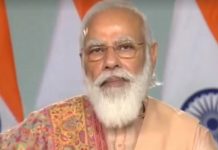Union Home Minister Amit Shah said that the government will move forward to open corridor for Sharda Peeth on the lines of Kartarpur. But PoK Assembly’s positive response to Amit Shah’s proposal within one week has surprised people on both sides of the border, writes Riyaz Wani
On March 22, Union Home Minister Amit Shah said that the government will move forward to open Sharda Peeth on the lines of the Kartarpur corridor. And on April 1, the government of Pakistan Occupied Kashmir proposed that Kashmiri Pandits and Hindus living in India should be allowed to visit the historic Sharda Peeth temple situated in the PoK, echoing Shah’s plan.
Sharda Peeth, an important pilgrimage site for Hindus, is located in the Neelum Valley of PoK in close proximity to the village of Teetwal in the Kupwara district of Jammu and Kashmir, right along the Line of Control (LoC).
The government has also built Sharda Mata Temple on this side of the Line of Control in the Teetwal area which the home minister inaugurated virtually.
Kartarpur corridor, which the Home Minister referred to, was opened in 2019, and links two important Sikh shrines — Dera Baba Nanak in Gurdaspur district of Punjab and Gurudwara Darbar Sahib in Kartarpur, Pakistan — and allows pilgrims to travel visa-free.
“The reconstruction of Maa Sharda’s temple in Kupwara is a necessary and important step in the direction of discovery of Sharda-civilisation and promotion of Sharda-script,” Amit Shah said while underlining the significance of the corridor. “Once upon a time, Sharda Peeth was considered the centre of knowledge in the Indian subcontinent. Scholars from all over the country used to come here in search of scriptures and spiritual knowledge. Sharda script is the original script of our Kashmir, which has been named after Maa Sharda.”
Surprise PoK move
It seems like a good idea that a Kartarpur-like corridor be replicated in Jammu and Kashmir. But the move of the PoK Assembly to positively respond to Amit Shah’s proposal within one week came as a surprise to people on both sides of the border. More so, when it was proposed by the Awami Muslim League led by Sheikh Rashid – an ally of Pakistan’s Tehreek-i-Insaf led by Imran Khan. Khan has been a bitter critic of the Narendra Modi-led government since the withdrawal of the special status of Jammu and Kashmir in August 2019.
The development has thus piqued curiosity on both sides of the border. People are asking how did the PoK Assembly immediately respond to Shah’s proposal. There are also speculations if the efforts to open the corridor arise out of some understanding on the back channel. After all, only a year after the revocation of J&K’s semi-autonomous status in 2019, India and Pakistan reinstated the 2003 ceasefire along the Line of Control which has still been holding. Although the two countries could not build upon the truce and initiate talks, the positive PoK response to Sharda Peeth indicates that the two neighbours might still be engaged in some form.
In Pakistan, however, there has been some harsh criticism of the PoK Assembly proposal. “The Kartarpur corridor is an international border, This is not an international border. We have always wanted that this Line of Control should not exist,” Pakistan’s former ambassador to India Abdul Basit said in an online video statement while expressing surprise that the PoK government rushed to endorse Amit Shah’s proposal.
He suggested that PoK and Pakistan governments should press for the reopening of the closed cross-LoC routes before volunteering to open the Sharda Peeth corridor. “Our eagerness to open Sharda Peeth is sending the wrong message to Kashmiris suffering persecution at the hands of the Modi government,” he said.
However, a PoK political activist Jamil Maqsood has termed the opening of the corridor as a “welcome step.” But he also echoed Basit’s line by stressing the reopening of the Line of Control and easing travel restrictions.
“The corridor will bring religious harmony among the people of PoK and India and will benefit the minority communities including Hindus, Muslims and Sikhs,” he told the ANI in an interview.












